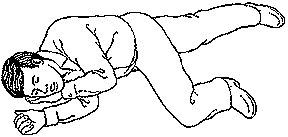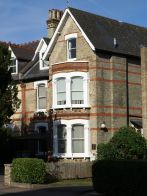Addington Medical Centre
46 Station Road, New Barnet, Herts, EN5 1QH
Telephone: 020 8441 4425
Sorry, we're closed

Emergency First Aid
With just a little basic first aid knowledge, you could help save someones life in an emergency situation. Basic first aid courses are run regularly in most areas around the UK. For example, the British Red Cross and St. John’s Ambulance provide first aid training in most locations around the country.
If someone is seriously injured or collapsed you should:
- dial 999 for an ambulance
- put your safety first by dealing with any possible dangers
- if safe, carry out basic first aid, such as checking the persons airway is clear, controlling any bleeding, or providing cardio-pulmonary resuscitation (CPR) for a person who is not breathing and whose heart has stopped beating
The following advice is not intended to replace professional instruction in first aid, but will help if you are faced with an emergency situation.
The recovery position
Putting someone who is unconscious in the recovery position will ensure that they maintain an open airway, and cannot swallow their tongue. It also ensures that any vomit or fluid will not cause choking.

Place the person on their side, ensuring that they are supported by one leg and one arm. Open the airway by tilting the head and lifting the chin.
If the persons airway is not open and s/he is not breathing, you should begin the ABC of resuscitation.
A – Airway, B – Breathing, C – Circulation
A – Airway
To open the airway, lift the chin with one hand, while pushing down on the forehead with the other to tilt the head back. Once the airway is open, look for chest movement and listen and feel for breathing by placing an ear close to the persons mouth.
B – Breathing
If, after opening the airway, the person does not begin to breathe spontaneously, artificial respiration should be started. To carry out artificial respiration:
- tilt the head back, lift up the chin, and pinch the nostrils together,
- seal your mouth over the persons mouth and, looking at the chest, take a deep breath,
- breathe slowly, but firmly into the person’s mouth, checking that their chest rises, and
- repeat until the person starts breathing, or assistance arrives.
C – Circulation
If there are no signs of life, that is, no heartbeat and no pulse (circulation), you should start external chest compression. To do this:
- Locate the persons sternum the middle of the breastbone, where the rib cage divides.
- Place the heel of your hand in the middle of the persons chest, and put the heel of your other hand on top of the first.
- Interlock your fingers and using the heel of your hand, press downwards firmly and quickly, approximately 4-5 centimetres (1 ½ to 2 inches), while keeping your elbows straight.
- After each compression, release the pressure on the chest without taking your hands off the breastbone.
The rate of compression should be about two compressions every second, or approximately 100 compressions per minute. Do 30 compressions, and then give two breaths. Repeat until assistance arrives.
Children and babies
For the purposes of first aid, an infant is defined as a child under one year old, and a child is between one year and puberty.
If the childs airway is not open and s/he is not breathing, you should begin the ABC of resuscitation. You should:
- give five initial rescue breaths before starting chest compression,
- perform CPR for approximately one minute before going for help (if you are on your own), and
- compress the chest approximately one-third its depth.
You should use the tips of two fingers for infants under one year of age, and the heel(s) of one or both hands in children over a year.
As with adults, for both infants and children, you should give 30 chest compressions to two breaths at a rate of about two compressions a second (approximately 100 a minute).




